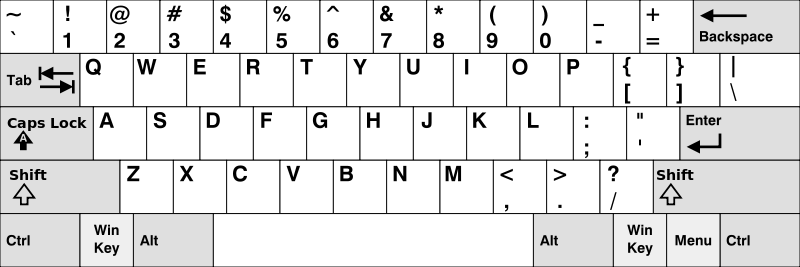LeetCode.500.Keyboard Row
题目描述
- 500 Keyboard Row
https://leetcode.com/problems/keyboard-row/description/
Given a List of words, return the words that can be typed using letters of alphabet on only one row’s of American keyboard like the image below.

Example 1:
Input: ["Hello", "Alaska", "Dad", "Peace"]
Output: ["Alaska", "Dad"]
Note:
- You may use one character in the keyboard more than once.
- You may assume the input string will only contain letters of alphabet.
解题过程
字符串处理题,本身不难,就是略显繁琐,并且就怕用暴力方法时间复杂度太高,但想了想也没啥巧方法,试着写了一个,没想到一次通过,而且速度还不慢,打败了76.85%的sub
package _500_KeyboardRow;
import java.util.ArrayList;
import java.util.List;
class Solution {
String firstRow="QWERTYUIOPqwertyuiop";
String secondRow="ASDFGHJKLasdfghjkl";
String thirdRow="ZXCVBNMzxcvbnm";
public String[] findWords(String[] words) {
List<String> resultList = new ArrayList<String>();
for(String word:words){
int firstLetterRow=whichRow(word.charAt(0));//第一个字符所在的行号
int i=1;
for(; i<word.length(); i++){
if(whichRow(word.charAt(i)) != firstLetterRow)
break;
}
if(i == word.length())
resultList.add(word);
}
return resultList.toArray(new String[0]);
}
//求ch所在的行号
private int whichRow(char ch){
if(firstRow.indexOf(ch) >= 0){
return 1;
}else if(secondRow.indexOf(ch) >= 0){
return 2;
}else{
return 3;
}
}
}
public class KeyboardRow {
public static void main(String[] args){
Solution solution = new Solution();
String[] input = {"Hello", "Alaska", "Dad", "Peace"};
String[] output = solution.findWords(input);
for(String word:output){
System.out.print(word+" ");
}
}
}
顺便学了下List转字符串数组的方法<T> T[] toArray(T[] a)的用法。
通过后看了看别人的代码,好多也都是挨个遍历看在哪行,有一部分是用map,典型代码如下:
public class Solution {
public String[] findWords(String[] words) {
String[] strs = {"QWERTYUIOP","ASDFGHJKL","ZXCVBNM"};
Map<Character, Integer> map = new HashMap<>();
for(int i = 0; i<strs.length; i++){
for(char c: strs[i].toCharArray()){
map.put(c, i);//put <char, rowIndex> pair into the map
}
}
List<String> res = new LinkedList<>();
for(String w: words){
if(w.equals("")) continue;
int index = map.get(w.toUpperCase().charAt(0));
for(char c: w.toUpperCase().toCharArray()){
if(map.get(c)!=index){
index = -1; //don't need a boolean flag.
break;
}
}
if(index!=-1) res.add(w);//if index != -1, this is a valid string
}
return res.toArray(new String[0]);
}
}
我感觉也不算太简单,只不过用了稍高级的数据结构。后来看到这道题被打上了哈希表的标签,那看来出题人就是想让用Map来解决。
Discuss里比较牛逼的是被顶的最高的一个帖子,Java版单行代码:
public String[] findWords(String[] words) {
return Stream.of(words).filter(s -> s.toLowerCase().matches("[qwertyuiop]*|[asdfghjkl]*|[zxcvbnm]*")).toArray(String[]::new);
}
用到了java8里新增的Stream流,还有正则表达式匹配,很高端,顺便看了看Stream是怎么用的。
GitHub代码
- 500 Keyboard Row
https://github.com/masikkk/algorithms/tree/master/leetcode/leetcode/_500_KeyboardRow
页面信息
location:protocol: host: hostname: origin: pathname: href: document:referrer: navigator:platform: userAgent: